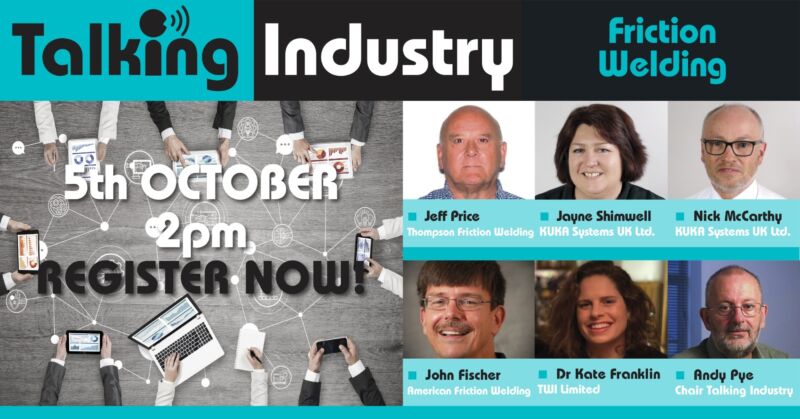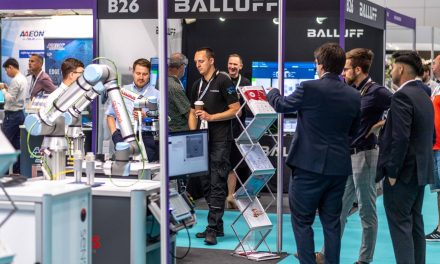As a fabrication process, welding has been utilised within manufacturing for decades. Traditional welding methods, however, aren’t always suitable for components intended for use within high-impact applications, such as drilling, automotive or power generation. Friction welding delivers an enhanced level of weld integrity, that in turn delivers a superior end product/component. Rotary and linear friction techniques can satisfy industrial joining needs across multiple sectors, though its utilization is still relatively low across the wider manufacturing spectrum, despite affording a number of significant advantages, such as: superior joint strength, very low risk for safety critical joints, fast weld times, economical, flexibility to weld wide range of similar & dissimilar materials.
TWI, AFW & KUKA Systems UK Ltd. possess a wealth of established and proven expertise within the field of friction welding and recognise the importance of quality component manufacture within the supply chain. So just how can these manufacturing principles be applied? Whether through capital investment, or subcontracting, this cost effective joining method is still hugely underutilized. Meet some of the industry’s leading authorities on friction welding and understand the plethora of benefits that can be achieved.
Registration Link
https://us02web.zoom.us/webinar/register/WN_LQ-JE-AWSu–zgkVSpAW9g
Panelists:

Over the last 30 years Jeff has been employed across several roles within Thompson Friction Welding, from engineering, to contract management; culminating in his present position as Operations Manager, North America. His main responsibility is to develop long term relationships with major users of friction welding machines in the North American market, promote the sale of the Thompson brand of friction welding machines & advocate the benefits attributed to the rotary friction welding process, as a solid-state joining process across a number of key market sectors.

Responsible for KUKA’s comprehensive subcontract friction welding provision and onsite metallurgical laboratory, that offers testing, analysis, validation and investigative work & also supports Thompson machine sales through weld quality assessment & weld quality reporting for FW machine pass-off. From 1995 as graduate, to current departmental Manager, Jayne has presided over many friction welding projects. Applications ranging from automotive, aerospace, cryogenic, nuclear, electrical, rail & more.
“People rely on friction welded products every day: vehicle axles, airbag cannisters, bi-metallic electrical connectors that keep rail networks moving & our lights on; cryogenic bi-metal joints found in satellite timekeeping equipment which in turn ensure your phones & watches keep the right time; cooling fins in hospital MRI machines. There are many applications owing to the breadth of materials that can be joined. Friction welding is a niche process but integral to our everyday lives”.

Nick has 35 years of Sales & Business Development experience, including thermal management solutions & plastics welding services. Nick recently spent eight years at KUKA UK within the Advanced Welding Solutions division (AWS). Five as Sales Manager for North America (USA, Canada and Mexico), with an emphasis on new business development. Latterly, as Business Unit Manager for AWS UK, including Thompson rotary & linear friction welding machines. This global role involved selling machines into China, Europe and North & South America, managing the Thompson UK sales team and liaising with KUKA subsidiaries across the globe. Nick’s more recent role was as Business Development Manager for Advanced Manufacturing Technologies group (AMT) at TWI. This included all metal joining sections including rotary friction, linear friction, friction stir, laser, arcs, thermal processes, laser additive & numerical modelling. Nick also provided business development support to specific sectors such as off highway, shipbuilding and also worked extensively with TWI’s International agents.

AFW have been partnering with Thompson Friction Welding since 1997. As one of the USA’s largest, established providers of subcontract friction welding solutions they have within their portfolio 14 friction welding machines. Established in 1986 AFW supply into a number of manufacturing sectors, including transportation, oil & gas and construction. Their expertise encompasses large diameter and long length component manufacture, as well as small diameter and short parts manufacture. “There are several benefits that are attributed to rotary friction welding,” John says. “The process provides a full-strength bond; it enables the joining of dissimilar materials, and near net shape welds can be achieved. RFW is an underutilised joining process that as a future manufacturing process, shall afford increased repeatable length capabilities.”

Kate has a degree in Materials Science and a Ph.D. in Structural Metallic Systems for Gas Turbine Applications from the University of Birmingham. Kate’s research was undertaken in collaboration with Rolls-Royce Plc and focused on friction welding of nickel super alloys. Since joining TWI Kate has lead friction welding projects employing a variety of materials for a range of industrial applications. As well as working with clients to research and develop friction welding processes for novel applications, she also considers design for manufacture and joint integrity.




